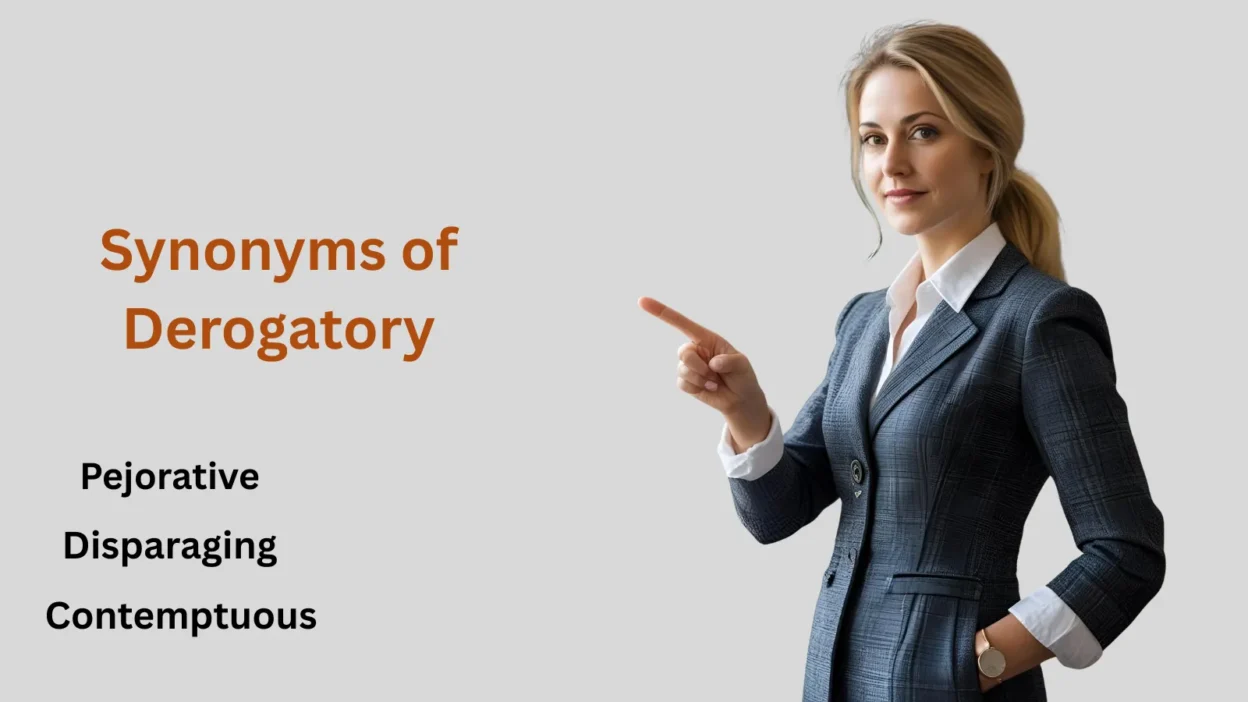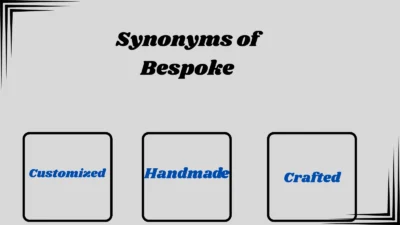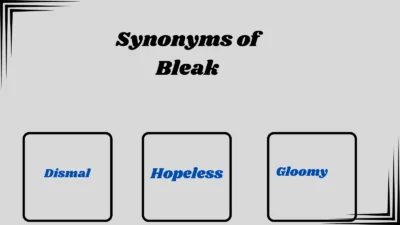Looking for the best synonyms of derogatory to sharpen your vocabulary or avoid offensive language? You’re in the right place. The word derogatory refers to speech, tone, or comments that are disrespectful, insulting, or meant to belittle someone or something.
If it’s a subtle jab, a rude remark, or a slur, derogatory language carries a harmful tone. It’s often used — consciously or not — to express contempt, disapproval, or disdain.
Such language can deeply affect how people feel, and in professional or public settings, it may damage relationships or reputations. Choosing the right alternative helps you stay respectful while still expressing criticism clearly.
In this guide, you’ll discover synonyms of derogatory—each with clear meanings, examples, and usage tips to help you choose the perfect word for every context.
Synonyms of Derogatory: What They Mean and When to Use Them
1. Disparaging
- Meaning: Expressing the opinion that something is of little worth.
- Use When: You want to highlight criticism that belittles, often subtly.
- Example: She made a disparaging remark about his cooking skills.
- Tone: Mildly negative, often with a hint of dismissiveness.
2. Pejorative
- Meaning: Having a negative or disparaging connotation.
- Use When: Discussing words or terms that carry insulting undertones.
- Example: The term “geek” was once purely pejorative but has softened over time.
- Tone: Formal; often used in linguistic or academic contexts.
3. Contemptuous
- Meaning: Showing deep disdain or scorn.
- Use When: You want to express strong disrespect or hatred.
- Example: His contemptuous laughter made everyone uncomfortable.
- Tone: Harsh and intense.
4. Insulting
- Meaning: Directly offending or hurting someone’s feelings.
- Use When: The disrespect is blunt and intentional.
- Example: That was an insulting comment about her work ethic.
- Tone: Clear and direct negativity.
5. Derisive
- Meaning: Expressing ridicule or mockery.
- Use When: You want to convey sarcastic or scornful criticism.
- Example: The crowd gave a derisive cheer after the mistake.
- Tone: Mocking and dismissive.
6. Disdainful
- Meaning: Showing contempt or lack of respect.
- Use When: To describe an attitude of superiority and scorn.
- Example: He gave a disdainful glance at the proposal.
- Tone: Cold and scornful.
7. Belittling
- Meaning: Making someone or something seem less important.
- Use When: The focus is on minimizing value or importance.
- Example: Her belittling remarks hurt his confidence.
- Tone: Mild to moderate negativity.
8. Sardonic
- Meaning: Grimly mocking or cynical.
- Use When: You want to show biting sarcasm with a dark humor twist.
- Example: He offered a sardonic smile when asked to apologize.
- Tone: Sharp, dry, and often witty.
9. Scornful
- Meaning: Openly showing contempt or disdain.
- Use When: Expressing strong disapproval and rejection.
- Example: She was scornful of the idea from the start.
- Tone: Very negative and judgmental.
10. Offensive
- Meaning: Causing someone to feel hurt or upset.
- Use When: The remark crosses a boundary of respect.
- Example: That joke was deeply offensive to many in the audience.
- Tone: Direct and sensitive.
11. Contumelious
- Meaning: Insolently abusive and humiliating.
- Use When: Describing very harsh, rude, or humiliating language.
- Example: The contumelious speech shocked the dignitaries.
- Tone: Formal, very strong insult.
12. Disrespectful
- Meaning: Showing a lack of respect or courtesy.
- Use When: You want a straightforward word for rude behavior or language.
- Example: His disrespectful tone annoyed the teacher.
- Tone: Mild to moderate.
13. Vitriolic
- Meaning: Filled with bitter criticism or malice.
- Use When: Remarks are acidic and intentionally harmful.
- Example: Her vitriolic comments ruined the meeting mood.
- Tone: Harsh and biting.
14. Derogative
- Meaning: Similar to derogatory; less commonly used.
- Use When: Formal or literary context to imply belittling.
- Example: The article included several derogative terms.
- Tone: Formal.
15. Denigrating
- Meaning: Criticizing unfairly or disparaging someone.
- Use When: When unfair or unjust criticism is present.
- Example: He was accused of denigrating his competitors.
- Tone: Negative, often unjust.
16. Uncomplimentary
- Meaning: Not flattering or praising.
- Use When: The criticism is gentle but still negative.
- Example: The review was uncomplimentary about the film’s plot.
- Tone: Mildly negative.
17. Critical
- Meaning: Expressing adverse or disapproving comments.
- Use When: Focus on judging or analyzing faults.
- Example: Her critical comments helped improve the design.
- Tone: Neutral to negative.
18. Snide
- Meaning: Derogatory in a sly or sneering manner.
- Use When: Remarks are subtly mocking or sarcastic.
- Example: His snide remarks alienated his friends.
- Tone: Sneaky and hurtful.
19. Jaundiced
- Meaning: Biased, prejudiced, or hostile.
- Use When: Opinions are negatively colored by experience or bias.
- Example: She had a jaundiced view of politics.
- Tone: Cynical or mistrustful.
20. Caustic
- Meaning: Severely critical or sarcastic.
- Use When: Words burn or sting emotionally.
- Example: His caustic wit often hurt people unintentionally.
- Tone: Sharp and harsh.
21. Acerbic
- Meaning: Sharp and forthright, often in speech or style.
- Use When: Wit or criticism is blunt and biting.
- Example: Her acerbic comments cut through the pretense.
- Tone: Cutting but clever.
22. Scathing
- Meaning: Severely critical and harsh.
- Use When: To express very strong criticism.
- Example: The critic’s scathing review devastated the director.
- Tone: Intense negativity.
23. Mocking
- Meaning: Making fun of in a cruel way.
- Use When: Humor is used to ridicule or scorn.
- Example: His mocking tone offended many classmates.
- Tone: Playful yet hurtful.
24. Sarcastic
- Meaning: Using irony to mock or convey contempt.
- Use When: Words say the opposite of what is meant.
- Example: She gave a sarcastic reply to his boast.
- Tone: Witty, biting.
25. Malicious
- Meaning: Intending to harm or upset.
- Use When: Insults are meant to wound deeply.
- Example: The malicious gossip spread false rumors.
- Tone: Mean and harmful.
26. Caustic
- Meaning: Bitterly sarcastic, capable of burning emotionally.
- Use When: Remarks are intended to hurt with sharpness.
- Example: The debate became filled with caustic comments.
- Tone: Very harsh.
27. Acrimonious
- Meaning: Angry and bitter in tone.
- Use When: The atmosphere or language is filled with hostility.
- Example: Their acrimonious argument lasted for hours.
- Tone: Bitter and harsh.
28. Pejorative
- Meaning: Expressing contempt or disapproval.
- Use When: Describing words with a negative implication.
- Example: The pejorative term was considered offensive by many.
- Tone: Formal.
29. Opprobrious
- Meaning: Expressing scorn or criticism.
- Use When: Harsh or shameful language is used.
- Example: The opprobrious remarks caused a stir.
- Tone: Strongly negative, formal.
30. Derisory
- Meaning: So small or unimportant it deserves scorn.
- Use When: Describing trivial or contemptible things.
- Example: The offer was derisory compared to the value.
- Tone: Dismissive and contemptuous.
How to Choose the Right Synonym for Derogatory
- Tone: If you want a mild, indirect criticism, words like disparaging or uncomplimentary work best. For strong, harsh insults, go for scathing, vitriolic, or malicious.
- Context: Use pejorative and derogatory terms mostly in formal or academic writing, especially when discussing language or terms. For everyday speech, insulting or mocking fits better.
- Emotion: To show humor mixed with insult, choose sarcastic or sardonic. If the insult is deeply hurtful, malicious or acrimonious, it can cause strong emotional damage.
- Cultural Sensitivity: Some words might be perceived as more severe or archaic (contumelious, opprobrious), so use them carefully depending on your audience’s familiarity.
Conclusion
Expanding your vocabulary with synonyms of derogatory allows you to communicate criticism or disrespect with precision and style. Each synonym carries its emotional tone, cultural weight, and situational appropriateness. If you want to be subtly dismissive, sharply sarcastic, or outright harsh, choosing the right word enriches your writing and conversation.
Next time you want to describe something or someone negatively, consider the shades of meaning these 30 alternatives offer.
This will help you express your thoughts clearly and with the perfect tone — from mild disapproval to biting scorn.



